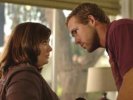Eye For Film >> Movies >> The Nines (2007) Film Review
The Nines is a mystery movie in the same way Mulholland Drive, Fight Club, and Donnie Darko are, a series of events that make cohesive sense only once the audience is in possession of a key. In the best, we are left guessing until the end, when suddenly the trail of breadcrumbs we have been left becomes an intellectually satisfying path out of the forest. The Nines is, sadly, not one of these.
It's written and directed by John August whose previous work includes three collaborations with Tim Burton and the Rashomon-influenced drug dealer movie Go. His talents as a writer are evident here, in execution if not in intent, but that speaks to the quality of the mystery which, in fairness, ought to be preserved.

Ryan Reynolds carries this movie, in three linked roles, in three loose chapters: As Gary, he convincingly plays a Hollywood icon under house arrest for a breakup-induced bender; as Gavin, a "show runner" (what used to be referred to as an executive producer) he lends a genuine sense of emotional distress to his attempts to balance his career goals and his friendships; and as Gabriel he manages to pull together the disparate strands as the audience does, but never feels as if he is leaving us behind. The range isn't huge, in fairness, but they're all so well played that it signals real talent.
The three sections deal with an actor, a television producer, and a videogame designer, and in each there is a sense of the participant observer that is central to the mystery. Reynolds is supported across the three 'stories' by Hope Davis and Melissa McCarthy. In the actor segment, they are seductive neighbour and dedicated publicist, in the television world they are a scheming executive and long-term muse (the latter of appears to have some parallels in real life), and to the video game designer they are a random stranger and a loving wife. In all of them, the chemistries feel genuine, the relationships real.
The Nines is beautifully realised. The cast are great, well used, well scripted for. The three segments interact well, with nods in each to others, all creating a cohesive sense of shared realities, all firmly and well grounded in their chosen milieu. Gary's Hollywood is excessive and inane in exactly the right ways; Gavin's Hollywood, behind the televisual scenes, has a perfectly judged mix of cameos and actors appearing 'as themselves'; and Gabriel's section has only one false note: it's unlikely, but telling, that a videogame designer in the mountains of California would forget the name 'Sierra'.
What lets it down is the ending, ultimately a fourth section, or perhaps an appended coda. It's too dry, possibly too neat, and too far removed from the quality displayed to be pleasing. It's not quite a 'deus ex machina', but it still leaves one feeling cheated. After all the care taken it's sad that the resolution is so cliched. All the threads are tied up, most everything is explained, and it takes but a little thought to resolve the way the 'key' has influenced each of the stories. It's not as ridiculous as the ending of Switchblade Romance, to be fair, but it produces a disconnect at least as severe as Bobby Ewing emerging from the shower.
It would be unfair to characterise The Nines as "light Lynch", but it's tempting. The sad thing is that a film of this quality has been created to service a mystery so unfulfilling.
Reviewed on: 14 Dec 2007





















